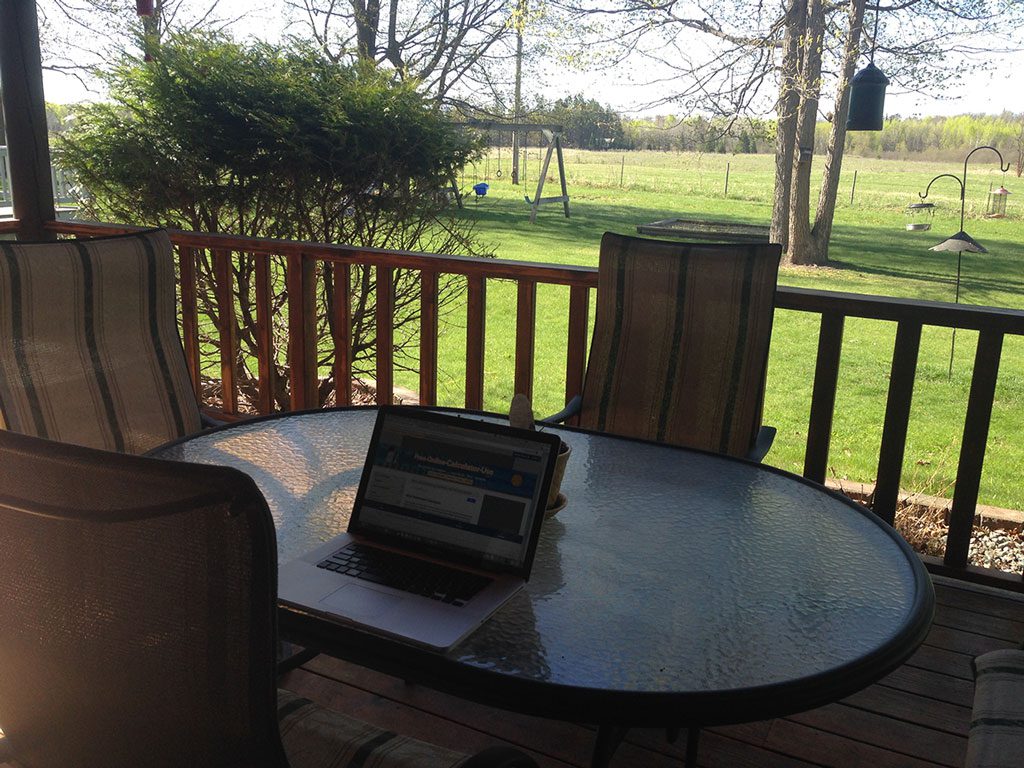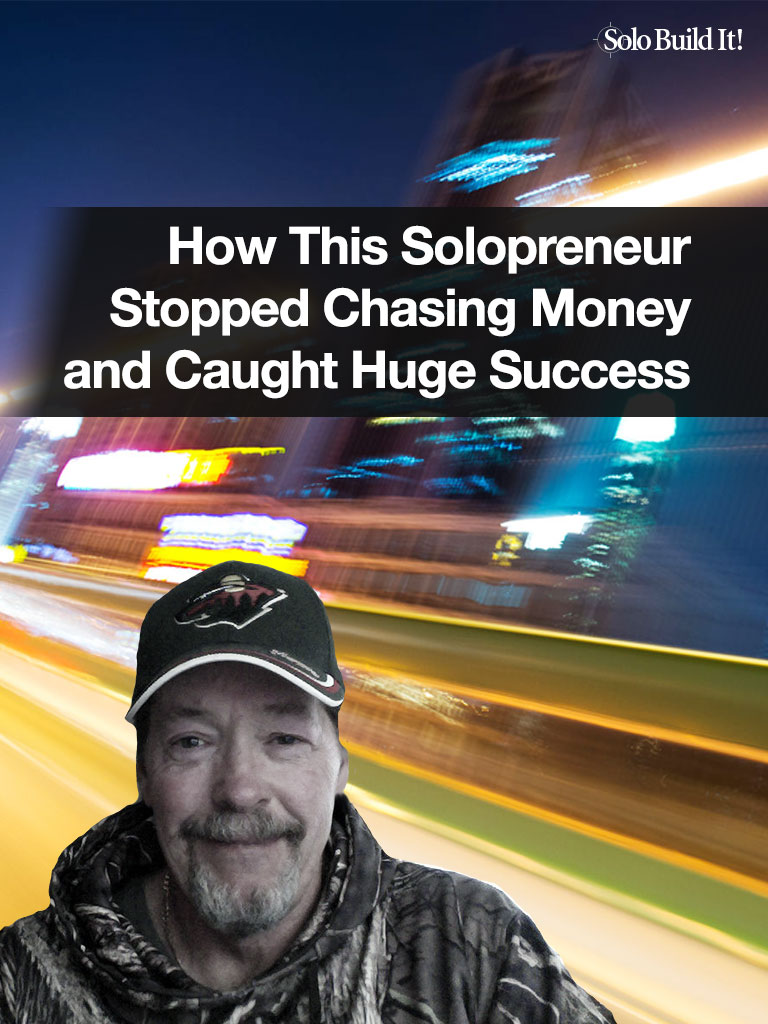
If you don’t enjoy and believe in your work, no amount of money can make you happy.Dan Peterson from free-online-calculator-use.com
It took Dan Peterson more than a decade of bouncing from one business attempt or get-rich-quick scheme to another until this simple truth dawned on him.
Dan knew early in his adolescence that he wanted to become an entrepreneur. He had the drive and perseverance to make it happen. But despite working 40 to 80 hour weeks (as a restaurant owner, one of his business endeavors), he didn’t achieve financial success, let alone happiness.
Eventually, he stopped and asked himself why. He realized that for all those years, he’d been chasing money with his various startups instead of pursuing a career aligned with his values and skills.
After a lot of experimentation and soul searching he discovered that what he enjoyed most was — believe it or not — building Excel spreadsheets.
So how do you turn a love for building Excel spreadsheets into a thriving online business? Let’s find out!
1. Dan, you tried lots of different jobs and business opportunities before settling on your SBI! online business. Can you tell us a bit about that journey?
Interest in owning my own business began when I started delivering newspapers at the age of 10. As an independent newspaper carrier I discovered I could basically set my own salary based on how many people I could get to sign up for a newspaper subscription. Of course, few could say “no” to a freckle-faced 10-year-old, so the selling part was easy.
As I grew into adulthood I discovered a couple of personal traits that seemed to steer me toward entrepreneurship:
- I couldn’t stand being told what to do.
- I didn’t need a boss cracking a whip for me to get my work done.
Unfortunately my primary motivator for becoming an entrepreneur was to make a lot of money. So I spent most of my 20’s doing what I had to do to support my family, all the while bouncing from one business attempt or get-rich-quick scheme to another.
Eventually my quest for wealth led to a restaurant purchase. After six years of working 80-hour weeks, a casino with a loss-leader restaurant moved into our neighborhood. A year later we were out of business and into bankruptcy. It was that financial crash and burn that jolted me into questioning everything I had let myself be taught.
After more than a year of soul-searching and reflecting on my past, it finally dawned on me that if you don’t enjoy and believe in your work, no amount of money can make you happy. After all, if you’re miserable 40-80 hours a week, it’s going to be extremely difficult to find anything outside of work that can offset that much unhappiness.
If you don't enjoy and believe in your work, no amount of money can make you happy. #solopreneur #freedomClick To TweetI eventually realized that my happiness was not dependent on how much money I made. Instead my happiness was dependent on the amount of freedom I had:
- Freedom to work at something I enjoy and believe in — regardless of what that work might pay.
- Freedom to give my family the time they deserve.
From there I knew there were two things I had to do to create the life I wanted:
- Get out of debt once and for all (reducing the need to make a ton of money).
- Start a business that was well suited to my talents, abilities, genuine interests, values, and personality traits.
It took Dan about a decade to realize that “making money” wasn’t the right motivator for his entrepreneurial spirit. Chasing after money didn’t make him happy. It didn’t even bring him financial success. He only became successful when he started to align his work with his skills, values and genuine interests. That’s why the SBI! Action Guide places so much emphasis on finding a business niche that you’re passionate about. Ask yourself “Why do I want to start an online business about vintage cars, raising rabbits, vegan cooking, or …?” If your honest answer is “because I could talk about it for hours and hours and I want to share my knowledge with the world,” then you’re on the right path. But if the first answer that pops into your head is “because I want to make a lot of money out of it,” then you may want to reconsider. Of course you should also choose a topic that has good business potential (SBI! helps you do this, step-by-step). But if “making money” is your main motivation for becoming a solopreneur, you are more likely to give up when the going gets tough. We particularly advise people to stay away from “make money” and internet marketing niches. These are highly competitive and cynical niches. Our Wealthy Affiliate review goes deep on how this niche works. Often their main purpose is to suck more people into a vicious “make money online” cycle rather than to produce a business with value and equity — a business you can be proud of.

After a lot of experimentation I discovered what I enjoyed most was building Excel spreadsheets. Unfortunately, in order to sell the spreadsheets, my potential customers also had to purchase and learn Excel. It was about that time, 1997, that I ran across some examples of what could be done with a scripting language called JavaScript. One of the examples was a calculator that worked on a web page. Bingo!
From there I reverse engineered the calculator, taught myself JavaScript on an as needed basis, and learned enough about creating web pages to build a website to sell my web page calculators (webwinder.com). A year later I was selling enough calculators to quit my job so I could work on my business full time.
All was going well until 2007. That was the year when my web host suddenly, and without warning, stopped supporting the “.php3” file extension. Unfortunately I had built my website pages with the “.php3” extension. This meant that all of the inbound links to my site suddenly started generating errors. Traffic to my site plummeted overnight.
Then, a year or so later, after rebuilding the site and finally starting to make a full recovery from the 2007 traffic losses, the housing market collapsed. Considering my main calculator clients were mortgage brokers and real estate agents, it was no surprise when calculator sales dropped by 60%.
Making matters worse, WordPress had started taking the web by storm. The bad news for me was that the hosted version of WordPress didn’t allow JavaScript at all, and even full-fledged programmers were having trouble getting my calculators to work on the downloadable version of WP.
By the end of 2009 my annual calculator sales had fallen from a high of $80,000 to a mere $6,000. Luckily, during the good years we managed to pay off all of our debts, including our house, and set aside a sizable rainy day fund. This gave me time to carefully plan my next move.
His search finally led him to discovering SBI!. And that’s where the true solopreneur success story began. Back over to Dan…
After 4 months of searching for new online business ideas, in April of 2010 I stumbled across a website promoting an online business-building tool called Site Build It! (now rebranded to Solo Build It! or simply SBI!). With the promise of teaching me how to find a profitable niche, and how to build a successful business around that niche, I signed up and began making my way through the Action Guide.
It took 4 months to learn the ropes and build a site blueprint that held high promise for success, so it wasn’t until September of 2010 that I actually started building free-online-calculator-use.com.

2. How did you decide about your niche, online calculators? How did you know it was the right topic for you and had great business potential?
When I first signed up with SBI! my intention was to create a website geared toward helping others to do what I did — to go from being trapped by debt in work I hated, to being free to work at what I love.
Unfortunately, no matter how deep I dug, I could not find any winnable keywords to build the site around. Either no one was searching for my keywords, or if they were, the competition was too stiff to expect to win for them on a small budget.
After a lot of research, I finally decided to try to build a winnable site blueprint around what I had already been doing, and loved doing, for the previous 13 years … online calculators. Except, instead of building the calculators for other online businesses, I would now build the calculators for consumer use and publish them to my own website.
To my pleasant surprise, I was easily able to create a site blueprint teeming with high demand, low supply keywords. This all but assured my success. All I had to do was to create top notch calculators based on the winnable keywords. Two years later, my free-online-calculator-use.com’s traffic was among the top .05% of all websites in the world (~170 million).
And the best part is, instead of creating calculators based on client specifications (like forcing an artist to paint-by-numbers), I’ve been free to create the calculators based on my own creative self-expression.
That’s where Solo Build It!’s Action Guide comes into play. The first five DAYs (or chapters) guide you step-by-step in identifying your “Goldilocks just-right niche.” In some cases, your initial idea is confirmed, but in other cases you may have to discard your original business idea because it’s not profitable enough or because the competition is too steep (as it was in Dan’s case). You may be tempted to skip the research part. Don’t. One of the top “success secrets” we hear from SBI! members is that they followed the Action Guide to a tee. Dan shares more “secrets” behind his phenomenal success below…
3. Your site, www.free-online-calculator-use.com gets crazy amounts of search engine traffic, 180K visitors per month from Google U.S. alone. What’s your “secret”?
The “secret” has 3 parts:
- SBI!’s Brainstorm It! tool. Although I had operated an online business for 13 years, I had never been exposed to, nor understood the immense power of, keyword research. Had I not had access to this tool, I most certainly would have started a website that was destined to fail.
A saying often used by golf instructors when teaching the golf swing is, “Feel and real are two different things.” That saying also applies to the online business world. What we think people will be interested in, and what they are actually interested in, are often two different things. The Brainstorm It! tool helped me to create a site around what people are actually interested in.
Some misinterpret keyword research as being mechanical or a manipulative type of search engine optimization (SEO), not understanding its true value. “Keywords” are the words that people use to search at Google and other engines. Brainstorm It! tells you… You are in the business of delivering content that people want (not what you “think” they want — a big difference). SBI! not only finds way more search terms that you could ever think up, it applies classic supply-and-demand to point out what topics you should write about.
- SBI’s constant reminder to create unique content that’s better than my competitors. Instead of just throwing a bunch of keywords on a page and calling it good, SBI! teaches you to study your competition and then make sure your content is different and better than theirs.
So before creating each calculator on my site, I studied every similar calculator I could find, made note of what I liked, what I didn’t like, and what I felt was missing. I then created the calculator based on those notes.
So when Google came out with the Panda algorithm, penalizing sites for thin and copied content, their traffic losses were my traffic gains.
Content: Get in front of your potential clients or customers by providing standout content. “Good enough” is not good enough! When you overdeliver on the information that people seek, wonderful things happen… Traffic: Web surfers find you, generating targeted Traffic. PRESell: Now you win them over by giving them what they want… quality solutions, answers, information! What’s the most common mistake online business owners make? They start at the end, at the Monetization part. They build sites about their businesses and their products and then are all set to Monetize (i.e., collect the money). There is little or no Content, at least not the type of information that people seek. So what? So no Traffic builds. And PREselling never gets a chance to build your “Brand of One.” Monetization is the final result of doing everything else (C T P M) correctly. “M” comes last. Dan understood and applied this concept perfectly.
- SBI!’s “Keep It Real” Mantra. Unlike so many other website owners, I did not follow the crowd when it came to link exchanges and unnatural backlink-building. Instead I focused on creating calculators that people would love, so my traffic would build naturally.
When Google came out with the Penguin algorithm, penalizing sites for questionable link-building tactics, once again, their traffic losses were my traffic gains.
What does that mean exactly? You must… 1) Publish content that’s original and delivers high-quality information, the answer to what the visitor seeks. In other words, provide a solution to a visitor’s problem, or help fulfill a visitor’s desire or need. 2) Encourage people to link to you by creating high-value content and promoting it through your social media platform(s) of choice. Think in terms of “link-earning,” not “link-building.” Deliberately setting out to “build” links used to work, but nowadays it’s more likely to result in Google penalties. “The only links worth having are the links you would still want if search engines didn’t exist” (from the Smart Person’s Guide for Link-Building).
4. Your online calculators are free to use. How do you make an income from your online business? Which monetization methods work best for you?
While I’ve tried many different monetization methods (affiliates, native apps, downloadable products, membership site, etc.), the only method that has generated significant income is contextual advertising. I believe the reasons for that are two-fold:
- When most people visit my site they are in the middle of solving a problem or making a decision. So when they use a calculator to find an answer central to the problem they are trying to solve, they instantly go back to what they were doing when the question arose.
- Because my calculators cover 17 different subject areas (from pregnancy to compound interest to hypotenuse), there is no single product offering that can target such a wide audience. And even when I try to segment the offerings based on the subject of the calculator, reason #1 still overrides the offer.
With contextual advertising, visitors end up seeing ads that are of interest to them — which appears to be the only way to draw their attention away from the problem they were trying to solve when they arrived at the site.
Recently I enlisted the services of an ad testing company called Ezoic to take over the ad optimizations on my site. Their product uses machine learning to discover the best ad sizes and placements for each individual visitor.
That partnership has turned my once falling ad revenues (mainly due to rise of mobile and ad blockers) into doubling my ad revenues from a year ago.
To achieve a higher profit margin, many online business owners move on to selling their own products or services. But, every niche is different. That’s why SBI! teaches a wide variety of monetization models, from AdSense to affiliate marketing to sponsorships to referrer’s fees to selling your own digital and even hard goods.
5. How long did it take to start earning income from your e-business? Is it a full-time or a part-time income?
For the first 9 months I focused only on building out my site, starting with the most winnable keywords and working toward the hardest-to-win keywords. By June of 2011 my site was averaging 1,000 visitors per day. It was then that I first signed up for AdSense and started placing contextual ads on my site’s pages.
The first month with contextual ads I earned $333. It took another year (June of 2012) before ad revenues grew to the point I no longer had to worry about possibly having to re-enter the job market. But again, we had no debts, so I didn’t need to earn a lot of money to pay the bills.
As of this writing, my income is 4 times what it was in 2012. But you’d never know it by what I drive, what I wear, where I play golf, etc. That’s because most of what I earn is being set aside to ensure I can continue to work at what I love during the next income downturn (nothing lasts forever).
Did it happen overnight? No. In fact, Dan worked diligently on building his website’s content for a full 9 months before he even began to monetize. We typically advise SBIers to start monetizing when they have at least 30 pages of high value content and a steady stream of about 100 visitors per day. Dan took an even more conservative approach. He waited until he was averaging 1,000 visitors per day before adding Google AdSense ads. That he earned $333 in the very first month shows that his patience paid off.
I’ve been happily working from my home office full-time, usually dressed in a ball cap and comfy sweatpants, since 1997. I still can’t wait to get out of bed each morning to get back to working on my business. And at age 57 (58 in June), instead of looking forward to retirement, I’m hoping I never have to retire.

I typically work from 6:00am to 1:30pm, 7 days a week (not because I have to, but because those are the hours I enjoy working). The rest of the time I’m free to focus on my family and my other passions.
I even used some of that free time, along with a lot of sweat equity, to carve my own golf driving range out of the woods next to the house. This gives me a place to work on another passion of mine, without having to drive to the course or pay for range balls.
In the fall the driving range is also where the boys and I site-in the rifles prior to our annual deer hunt — which also takes place behind the house.

6. You have experience in building websites outside of Solo Build It!. What are the benefits that you, as a tech-savvy person, get from using SBI!?
The main benefit I get from SBI! is the business-building and marketing insights and strategies. SBI! stays on top of what’s important in the online business world, and then reports back to its members on those things that matter.
In other words, SBI! scans the web and wades through all of the hype and junk to find the gems, so I don’t have to. That frees me up to just focus on building my business.
⏳ TIME ⏳ Every solopreneur is, by definition, time-limited. Solo Build It! enables solopreneurs to focus their limited time in the most efficient and effective way possible. Even the person with all the BAM in the world will fail if she does not focus her time onto the business-building task that matters most at any given point of the process.
7. You use social media to promote your online business. Which platform(s) work best for you and why?
While I do have Facebook, Twitter, Google Plus, and Pinterest accounts, I just haven’t had time to devote to growing my audiences. This is partly due to my calculators covering 17 different subject areas, making it difficult to target a specific audience.
This past March I enlisted the help of one of our sons, Doug, to see if he could grow Pinterest traffic to the site in his spare time. He works on creating, curating, and promoting pins for about an hour a day. In just three months he’s been able to increase the average monthly Pinterest views from 15,000 to 180,000.
The plan is that once Doug gets a good handle on generating Pinterest traffic, he’ll then start working on learning how to use Facebook to drive traffic. Then on to Twitter, and later Instagram. If it turns out he truly enjoys the work, we’ll work toward a day when he can go full-time in the business, or start his own online business if he prefers.
That’s why we typically advise that you pick just two, or at the most three, social platforms and do those well rather than trying to be everywhere. Which channel should you pick? That depends entirely on your niche and the demographics of your audience. DAY 4 of the SBI! Action Guide walks you through the process of building a picture of your ideal site visitor. It will leave you with detailed information about your customer “persona,” which you can use to match up with social platform target groups. Dan’s case is rather unique as his target audience varies widely in interests and demographics. A visitor interested in his retirement planning calculator will have a very different “persona” from someone looking for a pregnancy countdown calculator. Dan has to use different platforms to reach his different target audiences.
8. What has been your biggest challenge so far as a solopreneur?
My two biggest challenges have been making my calculators mobile friendly, and trying to come up with a way to offset ad blockers. These two challenges have combined to create over two years of work. It took me over a year to build the separate mobile version of my site, and 15 months to build the ad-free subscription version of the site.
Unlike most text- and/or image-based content sites, my calculators and their results are tabular in nature. This makes fitting them into a 320-pixel viewport, while maintaining user experience, no easy task.
My calculator offering would be twice what it is now if I could have just remained focused on creating and improving calculators instead of having to create three separate versions of the 241 calculators. But it’s these ever blooming challenges that keep my work fun and engaging.
I am now currently spending several more months attempting to combine all three sites into a single responsive design. Hopefully then I can finally get back to just building and improving calculators for my visitors.
Another solution would be to develop alternative income streams (which Dan tried as well, but — for the reasons he explained above — didn’t work out for him). Other solopreneurs, however, are very successful in finding alternative monetization methods. Jill Loeffler, for example, a solopreneur with a business in the travel niche, increased her earnings when she completely removed AdSense and replaced it with high quality, relevant affiliate program offers. Dan’s second big challenge, to make his content mobile friendly, is unique to his type of content. His calculators and their results are tabular in nature. It’s much harder to have them display nicely on smaller screens than just text and images. 99% of SBI! members don’t have to worry about making their websites mobile friendly. SBI! provides fully responsive templates and a module called “Mobilize It!” to ensure that your content looks good and works well on all types of devices.
9. And finally… What do you enjoy most about being an online business owner? How has it changed you, your life, your family?
I love the fact that I can work from anywhere as long as there’s an internet connection. One of my favorite places to work from is the balcony outside of our room at the Playa Azul Hotel in Cozumel, Mexico.

Both my wife and I love to play golf, so each winter we travel to a warm climate to play golf for a week or two (we’ve been to Cozumel 11 times!). This past winter we chose to take our golf vacation in Southern Alabama so we could spend time with son James and his family.

And because I can stay caught up on my work while we’re gone, I never have to worry about scrambling to catch up when we get back home.
But my favorite part about being an online business owner is the freedom to live my life by my own design — based on what’s important to me.
Being an online business owner = Freedom to live life by my own design #OnlineBiz #SolopreneurClick To TweetWhile I have the occasional frustrating work day, most days I feel like the luckiest human being on the planet! Being debt-free to serve others from home through work that I love is about as good as it gets.
I’m 100% free to decide exactly how I will spend my life’s most precious and limited resource … my time. With my wife’s permission, of course.
Thanks to owning an online business, and to SBI!’s online business-building guidance, I haven’t had to miss a single important family activity or function in 20 years.
In fact, my main source of unhappiness over that time period has been watching my family and friends be enslaved by the rat race they’ve been taught to join. Or seeing other children look up into the bleachers or auditorium and not see their parents there cheering them on.
But no matter how hard I try to convince friends, family, and even my site visitors, that they are being misled into being enslaved by money lenders, my tiny voice gets drowned out by the daily onslaught of expertly designed sales presentations, all selling the underlying belief that the more money you have to spend, the happier you will be.
Often people attempt to live their lives backwards, they try to have more things or more money in order to do more of what they want so that they will be happier. The way it actually works is the reverse. You must first be who you really are then do what you need to do in order to have what you want.Margaret Young
I still hope to eventually build a website for the sole purpose of teaching others how to stop living their lives for money lenders, and instead live life on their own terms and by their own design. But I will do so knowing that niche is not winnable (too saturated with self-serving lenders who have deep pockets), and therefore likely won’t be profitable.
In the meantime I will continue to create and improve calculators that people are searching for, all the while trying to alert them to the hidden opportunity costs of chasing after money and material possessions ahead of chasing after emotional profits.
Not only is he doing what he loves to do, when and from where he wants to be, but he’s also helping tens of thousands of people across the globe with his free online calculators. We agree with Dan… that kind of life is about as good as it gets. Intrigued by Dan’s story? To live life on your terms, get started with your solopreneur career now!

Latest posts by Margit Streifeneder (see all)
- From Traffic Peaks to Auto-Pilot: A Psychologist’s Website Success Story - March 27, 2025
- From Swim Teacher to Solopreneur: Building Passive Income Online - February 27, 2025
- From Concierge to Global Tours: 10 Lessons for Travel Business Growth - December 19, 2024

